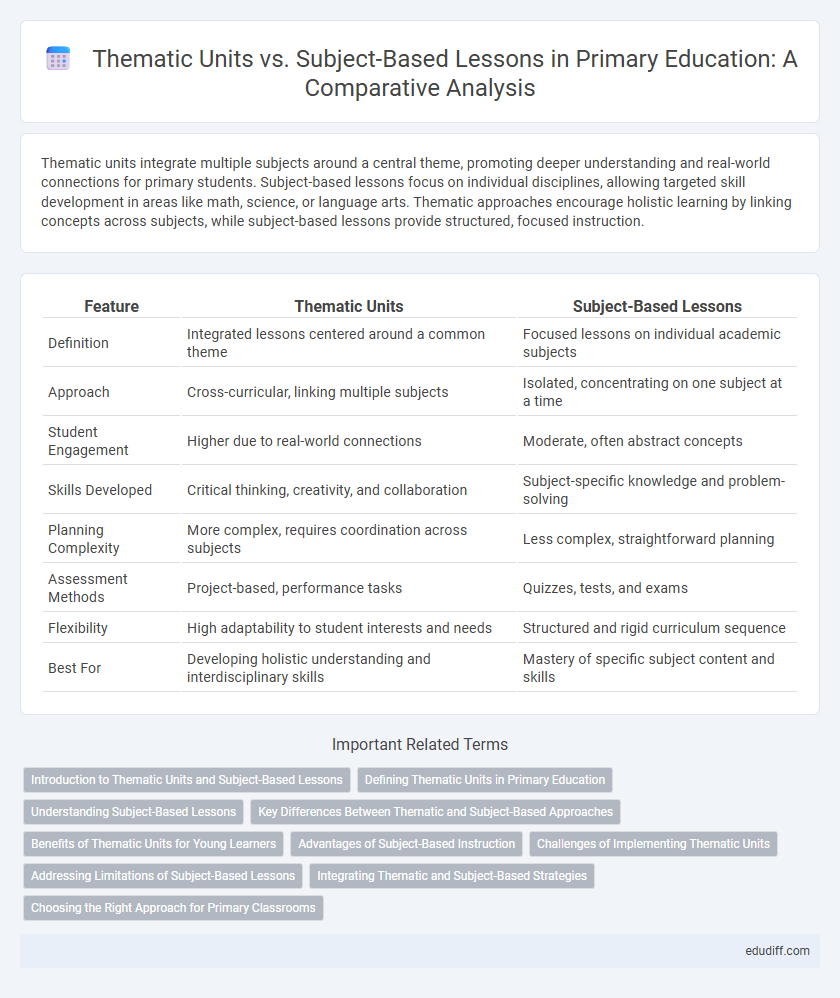Thematic units integrate multiple subjects around a central theme, promoting deeper understanding and real-world connections for primary students. Subject-based lessons focus on individual disciplines, allowing targeted skill development in areas like math, science, or language arts. Thematic approaches encourage holistic learning by linking concepts across subjects, while subject-based lessons provide structured, focused instruction.
Table of Comparison
| Feature | Thematic Units | Subject-Based Lessons |
|---|---|---|
| Definition | Integrated lessons centered around a common theme | Focused lessons on individual academic subjects |
| Approach | Cross-curricular, linking multiple subjects | Isolated, concentrating on one subject at a time |
| Student Engagement | Higher due to real-world connections | Moderate, often abstract concepts |
| Skills Developed | Critical thinking, creativity, and collaboration | Subject-specific knowledge and problem-solving |
| Planning Complexity | More complex, requires coordination across subjects | Less complex, straightforward planning |
| Assessment Methods | Project-based, performance tasks | Quizzes, tests, and exams |
| Flexibility | High adaptability to student interests and needs | Structured and rigid curriculum sequence |
| Best For | Developing holistic understanding and interdisciplinary skills | Mastery of specific subject content and skills |
Introduction to Thematic Units and Subject-Based Lessons
Thematic units integrate multiple subject areas around a central theme, enhancing coherence and real-world connections in learning. Subject-based lessons focus on individual disciplines, emphasizing depth and skills specific to each subject. This approach supports targeted content mastery, while thematic units promote interdisciplinary understanding and engagement.
Defining Thematic Units in Primary Education
Thematic units in primary education integrate multiple subjects around a central theme, promoting deeper understanding and connections across disciplines. This approach enhances student engagement by relating curriculum content to real-world contexts and encourages critical thinking and creativity. Unlike subject-based lessons, thematic units support holistic learning and help develop cross-curricular skills essential for young learners.
Understanding Subject-Based Lessons
Subject-based lessons concentrate on isolated disciplines such as math, science, or history, allowing for deep, focused exploration of specific concepts and skills. This approach promotes specialized knowledge acquisition and helps students develop expertise within each subject area. Emphasizing clear curriculum standards and assessment criteria, subject-based lessons facilitate targeted evaluations of student progress.
Key Differences Between Thematic and Subject-Based Approaches
Thematic units integrate multiple subjects around a central theme, promoting interdisciplinary learning and real-world connections, while subject-based lessons focus on isolated discipline-specific content. Thematic approaches enhance student engagement and critical thinking by linking concepts across subjects like science, language arts, and social studies. In contrast, subject-based instruction emphasizes depth within individual subjects, fostering mastery of specific skills and knowledge.
Benefits of Thematic Units for Young Learners
Thematic units engage young learners by connecting multiple subjects around a central theme, fostering deeper understanding and retention. This approach enhances critical thinking and language development by providing real-world context and meaningful content. Young students benefit from integrated learning experiences that boost motivation and encourage exploration across disciplines.
Advantages of Subject-Based Instruction
Subject-based instruction enhances deep content mastery by allowing students to focus intensely on one discipline, fostering specialized knowledge and skill development. It aligns with standardized curricula and assessments, making it easier to measure and track academic progress across defined subject areas. This approach supports systematic lesson planning and leverages subject-specific teaching strategies that cater to cognitive development stages in learners.
Challenges of Implementing Thematic Units
Implementing thematic units presents challenges such as aligning content with standardized curriculum requirements and ensuring comprehensive assessment across diverse subjects. Teachers often face difficulties in managing interdisciplinary planning and providing adequate resources that support thematic integration. Balancing depth of subject knowledge with broad thematic exploration requires strategic instructional design and ongoing professional development.
Addressing Limitations of Subject-Based Lessons
Subject-based lessons often lead to fragmented knowledge, limiting students' ability to make interdisciplinary connections essential for real-world application. Thematic units address this by integrating various subjects around a central theme, enhancing deeper understanding and critical thinking skills. This approach promotes holistic learning, overcoming the compartmentalization inherent in traditional subject-based instruction.
Integrating Thematic and Subject-Based Strategies
Integrating thematic units with subject-based lessons enhances cognitive connections by aligning interdisciplinary concepts around central themes, promoting deeper understanding and retention. This approach allows educators to design curriculum that simultaneously addresses subject-specific skills while fostering critical thinking through thematic exploration. Research shows that learners engaged in such integrated frameworks demonstrate improved problem-solving abilities and higher engagement across multiple subjects.
Choosing the Right Approach for Primary Classrooms
Thematic units integrate multiple subjects around a central theme, fostering deeper connections and real-world applications in primary classrooms. Subject-based lessons focus on discrete skills and knowledge within each discipline, ensuring targeted mastery and systematic progression. Selecting the right approach depends on curriculum goals, student needs, and available resources to balance engagement with academic rigor.
Thematic Units vs Subject-Based Lessons Infographic

 edudiff.com
edudiff.com